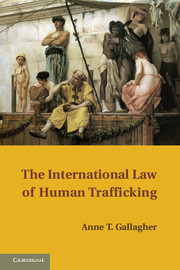Book contents
- Frontmatter
- Contents
- Preface
- Table of Cases
- Table of Treaties and Other International Instruments
- Table of Common Abbreviations
- THE INTERNATIONAL LAW OF HUMAN TRAFFICKING
- Introduction
- 1 The International Legal Definition
- 2 The International Legal Framework
- 3 Specific Legal Issues
- 4 State Responsibility for Trafficking
- 5 Obligations of Protection and Support
- 6 Obligations Related to Repatriation and Remedies
- 7 Obligations of an Effective Criminal Justice Response
- 8 Obligations to Prevent Trafficking and Respond Lawfully
- 9 Issues of Compliance, Implementation, and Effectiveness
- Epilogue
- Select Bibliography
- Index
- References
9 - Issues of Compliance, Implementation, and Effectiveness
Published online by Cambridge University Press: 10 January 2011
- Frontmatter
- Contents
- Preface
- Table of Cases
- Table of Treaties and Other International Instruments
- Table of Common Abbreviations
- THE INTERNATIONAL LAW OF HUMAN TRAFFICKING
- Introduction
- 1 The International Legal Definition
- 2 The International Legal Framework
- 3 Specific Legal Issues
- 4 State Responsibility for Trafficking
- 5 Obligations of Protection and Support
- 6 Obligations Related to Repatriation and Remedies
- 7 Obligations of an Effective Criminal Justice Response
- 8 Obligations to Prevent Trafficking and Respond Lawfully
- 9 Issues of Compliance, Implementation, and Effectiveness
- Epilogue
- Select Bibliography
- Index
- References
Summary
The international legal framework around trafficking includes a range of institutions and processes established for the specific purpose of overseeing and thereby promoting national implementation of the applicable international legal rules. The web of formal compliance mechanisms is dense and expanding – a reflection of the complexity of the trafficking phenomenon, its cross-cutting nature, and the increasing commitment of States and others to be doing (or to be seen to be doing) something about trafficking. It includes institutions and mechanisms set up under the specialist trafficking treaties, as well as the human rights bodies that exercise monitoring authority over certain aspects of the legal framework. Supplementing (and sometimes supplanting) these mechanisms are less traditional structures and processes. This category extends to encompass the controversial but highly influential unilateral reporting and sanctions system established by the U.S. government, as well as transnational networks operating within and between national government agencies, IGOs, and NGOs.
The present chapter commences with a brief consideration of compliance theory and of some of the factors or variables that may help explain and even predict the impact of international legal rules relating to trafficking on the behavior of States. The chapter then examines the structure, functioning, and potential of the major compliance mechanisms identified above: international bodies established under specialist treaties; international human rights mechanisms; the U.S. reporting and sanctions system; and transnational networks.
- Type
- Chapter
- Information
- The International Law of Human Trafficking , pp. 461 - 498Publisher: Cambridge University PressPrint publication year: 2010



